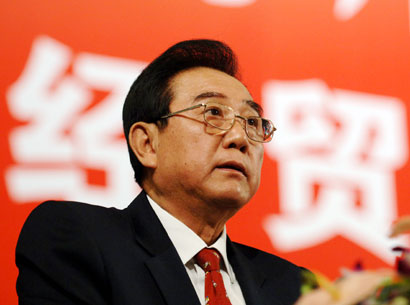|
Beijing unveils new policies for Taiwan
(Xinhua)
Updated: 2006-04-15 19:55
The two-day-long cross-Strait Economic and Trade Forum concluded in Beijing
on Saturday with a beneficial policy package and Joint Proposals.
Chen
Yunlin, director of the Taiwan Work Office of the Communist Party of China (CPC)
Central Committee, made a speech at the closing ceremony of the forum, saying
that the Joint Proposals set forth by the forum was the wisdom product of the
compatriots from both sides of the Strait and reflected their common aspiration.
"We will give priority to the Joint Proposals and make strenuous efforts to
realize the proposals into reality"

Chen Yunlin, director
of the Taiwan Works Office of the Communist Party of China (CPC) Central
Committee, announces a new package of policies to promote cross-Straits
trade at the closing ceremony of the Cross-Straits Economic and Trade
Forum in Beijing April 15, 2006. [Xinhua] |
Wu
Poh-hsiung, vice chairman of the Chinese Kuomintang (KMT), or the Nationalist
Party, at the closing ceremony that "on the basis of the '1992 consensus,' the
institutionalized exchanges between the mainland and Taiwan should be resumed."
The "1992 consensus" says that both sides across the Taiwan Straits accept
the "one-China principle," but with their own interpretations.
He also
hoped that the the Democratic Progressive Party (DPP) authorities could realize
the people's interests and aspiration and accept the agreement reached on the
forum as soon as possible.
Lin Feng-cheng, deputy board chairman of the
Kuomintang's Policy Foundation said the Joint Proposals, based on participants'
heated discussion, pointed a detailed prospect for the cross-Strait economy and
trade development and deserved us to make great efforts to realize
them.
Chen announced the Chinese mainland's 15 new beneficial policies
for promoting economic and trade relations across the Taiwan Strait at the
closing ceremony.
The beneficial policy package is comprised of three
sets of policies directly stipulated by the State Council and 12 others
formulated by relevant central government departments.
The three sets of
State Council policies included to add four species in a list of Taiwan-grown
fruits, which currently have 18 species, for Taiwan exporters; to adopt a
zero-tax on imports of 11 kinds of vegetables produced by Taiwan farmers and to
allow more imports of Taiwan's aquatic products, with zero-tax on some of the
products, and allow Taiwan fishing boats to enjoy equal policies as their
mainland counterparts for selling their own products.
Under the other
new policies, the Chinese mainland will recognize university diplomas issued in
Taiwan.
The mainland will issue the Method on the Management of Mainland
Residents to Visit Taiwan Area. The Ministry of Public Security adds Shenyang,
Dalian and Chengdu cities to issue valid passes for Taiwan visitors to enter the
mainland, in addition to the existing five cities of Haikou, Sanya, Xiamen,
Fuzhou, and Shanghai.
Special clinics will be established for Taiwan
visitors in some mainland cities. Doctors working in these clinics could come
either from the mainland or from Taiwan, but they have to acquire official
approval by the relevant mainland authorities.
Taiwan investors will be
allowed to set up joint venture hospitals in the mainland with local partners,
while Taiwan investors could hold as much as 70 percent of the stake.
Taiwan compatriots will be allowed to get license for medical practice
in the mainland, after they pass official examinations. They are permitted to
work in the mainland for a period of one year, but the term could be extended by
relevant mainland authorities, once it expires.
The two-day-long forum
gave positive evaluation on the endeavor for promoting cross-Strait economy
jointly made by the CPC and KMT during the past year and raised Joint Proposals
to nail down how to implement the negotiation results by the CPC and KMT leaders
and how to deepen the cross-Strait economic exchange and cooperation in future.
Li Bingcai, deputy director of the Taiwan Work Office of the CPC Central
Committee, announced the Joint Proposals, which included seven aspects.
The most eye-catching ones include asking Taiwan authorities to allow
the financial institutions from the Chinese mainland to set up branch offices in
Taiwan; continuing to push forward the cross-Strait direct transport; removing
obstacles in cross-Strait economy and trade and building cross-Strait common
market.
For promoting the direct transport across the Taiwan Strait, the
two sides across the Strait are urged to follow the example of "Macao Talks"
which found resolutions for the Spring Festival charter flights across the
Strait in 2005, according to the Joint Proposals.
Jia Qinglin, a member
of the Standing Committee of the Political Bureau of the CPC Central Committee
and chairman of the National Committee of the Chinese People's Political
Consultative Conference (CPPCC), and Chinese Kuomintang (KMT) Party honorary
chairman Lien Chan attended the closing ceremony Saturday afternoon.
The
two-day-long forum, at the joint sponsorship of a research center of the Taiwan
Work Office of the CPC Central Committee and a research fund of the KMT, focused
on cross-Strait economic and trade exchanges and opening direct transport links.
|
| |
|
| |
|